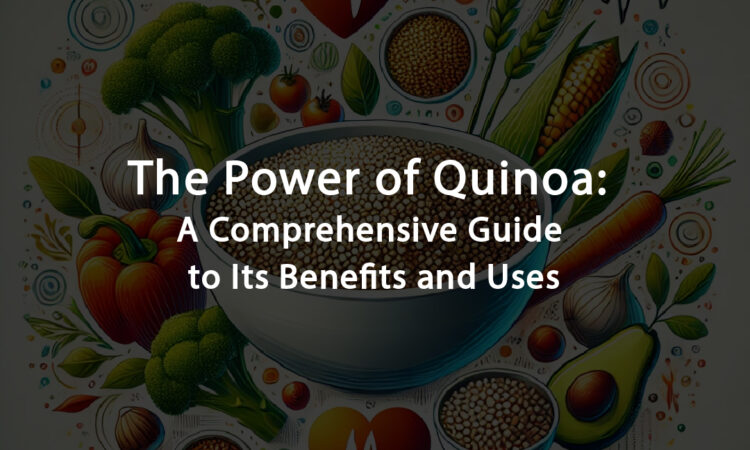Quinoa (pronounced KEEN-wah) has gained immense popularity over the past decade as a superfood, thanks to its impressive nutritional profile and versatility. Often referred to as the “mother of all grains,” quinoa is not technically a grain but a seed from the Chenopodium quinoa plant. Native to the Andean region of South America, quinoa has been a staple food for thousands of years, providing nourishment to the ancient Incas and other civilizations.
In this comprehensive guide, we will explore what quinoa is, its nutritional benefits, how it can be used as an alternative to other foods, and the various health issues it can help address. Whether you are looking to improve your diet, manage a health condition, or simply try something new, quinoa is an excellent addition to your pantry.
What is Quinoa?
Quinoa is a flowering plant species that belongs to the amaranth family. It is primarily grown for its edible seeds, which are harvested and prepared similarly to grains like rice and wheat. There are over 120 different varieties of quinoa, but the most commonly found types are white, red, and black quinoa. Each variety has a slightly different flavor and texture, making quinoa a versatile ingredient in the kitchen.
One of the unique features of quinoa is its high nutrient density. Unlike many other plant-based foods, quinoa is a complete protein, meaning it contains all nine essential amino acids that the human body cannot produce on its own. This makes it an excellent choice for vegetarians, vegans, and anyone looking to increase their protein intake.
Nutritional Composition of Quinoa
Quinoa is packed with nutrients that contribute to its superfood status. Here’s a closer look at what makes quinoa so nutritious:
- Protein: Quinoa contains around 8 grams of high-quality protein per cup (cooked). As a complete protein, it provides all the essential amino acids, including lysine, which is often lacking in plant-based diets.
- Fiber: With about 5 grams of dietary fiber per cup, quinoa helps support digestive health and maintain steady blood sugar levels.
- Vitamins and Minerals: Quinoa is rich in vitamins and minerals such as magnesium, iron, potassium, calcium, phosphorus, and folate. It is also a good source of B vitamins, including riboflavin (B2) and vitamin B6.
- Antioxidants: Quinoa contains various antioxidants, such as quercetin and kaempferol, which help protect the body from oxidative stress and inflammation.
- Healthy Fats: Quinoa provides healthy fats, including omega-3 and omega-6 fatty acids, which support heart and brain health.
- Low Glycemic Index: Quinoa has a low glycemic index (GI), meaning it does not cause rapid spikes in blood sugar levels. This makes it a suitable option for people with diabetes or those looking to manage their blood sugar.
Health Benefits of Quinoa
Quinoa’s rich nutritional profile translates into numerous health benefits. Here are some of the key benefits of including quinoa in your diet:
1. Supports Weight Management
Quinoa is an excellent food for those looking to manage their weight. Its high protein and fiber content help increase feelings of fullness and satiety, which can reduce overall calorie intake. Protein also boosts metabolism by increasing the thermic effect of food, meaning your body burns more calories during digestion.
The fiber in quinoa slows down the digestion process, keeping you fuller for longer and helping to regulate appetite. This combination of protein and fiber makes quinoa an ideal choice for weight loss and maintenance.
2. Promotes Digestive Health
The fiber content in quinoa promotes healthy digestion by adding bulk to the stool and supporting regular bowel movements. It can help prevent constipation and maintain overall gut health. Additionally, the prebiotic fiber in quinoa serves as food for beneficial gut bacteria, supporting a healthy gut microbiome.
Quinoa also contains saponins, natural compounds that have antimicrobial and anti-inflammatory properties. These compounds may help protect the digestive tract from harmful bacteria and reduce inflammation.
3. Manages Blood Sugar Levels
Quinoa has a low glycemic index, which means it has a minimal impact on blood sugar levels. This makes it a suitable food for people with diabetes or those at risk of developing the condition. The combination of protein, fiber, and complex carbohydrates in quinoa helps slow down the absorption of sugar into the bloodstream, preventing rapid spikes in blood glucose levels.
Studies have shown that incorporating quinoa into a meal can reduce post-meal blood sugar spikes compared to meals that include refined grains like white rice or pasta. This makes quinoa an excellent choice for maintaining steady blood sugar levels.
4. Supports Heart Health
Quinoa’s nutrient profile makes it heart-healthy. It is high in heart-protective nutrients like magnesium, potassium, and fiber. Magnesium helps relax blood vessels, reducing blood pressure and lowering the risk of heart disease. Potassium works to balance sodium levels in the body, further contributing to healthy blood pressure levels.
The soluble fiber in quinoa helps lower cholesterol levels by binding to bile acids and removing them from the body. This reduces the amount of cholesterol absorbed into the bloodstream, decreasing the risk of heart disease and stroke.
5. Provides Essential Nutrients for Bone Health
Quinoa is a good source of calcium, magnesium, and phosphorus, all of which are essential for maintaining strong and healthy bones. These minerals help build and maintain bone density, reducing the risk of osteoporosis and fractures. For individuals who are lactose intolerant or do not consume dairy products, quinoa is an excellent alternative source of calcium and other bone-supporting nutrients.
6. Boosts Immune Function
Quinoa contains several nutrients that support a healthy immune system, including zinc, iron, and vitamin B6. Zinc is essential for the development and function of immune cells, while iron supports the production of red blood cells that transport oxygen throughout the body. Vitamin B6 plays a role in the production of antibodies, which help protect the body from infections.
The antioxidants in quinoa, such as quercetin and kaempferol, also contribute to immune health by reducing inflammation and protecting cells from damage caused by free radicals.
7. Supports Skin Health
The antioxidants and anti-inflammatory compounds in quinoa can benefit skin health by protecting against oxidative stress and reducing inflammation. Quinoa is also a source of lysine, an amino acid that plays a role in collagen production, which is essential for maintaining skin elasticity and firmness.
Additionally, the vitamin E and B vitamins in quinoa help nourish the skin and promote a healthy complexion. Including quinoa in your diet can support overall skin health and reduce the appearance of aging.
Quinoa as an Alternative to Other Foods
Quinoa is incredibly versatile and can be used as a substitute for various foods in your diet. Here are some common alternatives:
1. Substitute for Rice
Quinoa can be used in place of rice in most dishes, such as stir-fries, pilafs, and casseroles. It has a slightly nutty flavor and a fluffy texture that works well in savory and sweet dishes alike. Quinoa is higher in protein and fiber compared to white rice, making it a more nutrient-dense option.
2. Substitute for Pasta
For those looking to reduce their carbohydrate intake or increase their protein and fiber consumption, quinoa can be a great alternative to pasta. Use it as a base for pasta salads or serve it with your favorite sauces and toppings.
3. Substitute for Oatmeal
Quinoa can be used as a warm breakfast cereal in place of oatmeal. Cook quinoa with your choice of milk or water, and top it with fresh fruits, nuts, seeds, and a drizzle of honey or maple syrup for a delicious and nutritious breakfast.
4. Substitute for Flour
Quinoa flour can be used as a gluten-free alternative to wheat flour in baking. It works well in pancakes, muffins, cookies, and bread, providing a nutty flavor and a boost of protein and fiber.
Health Conditions Quinoa Can Help Manage
Quinoa’s nutrient profile makes it beneficial for managing various health conditions. Here are some conditions that may benefit from including quinoa in the diet:
1. Diabetes
Quinoa’s low glycemic index and high fiber content make it a suitable food for managing blood sugar levels in people with diabetes. The fiber and protein in quinoa slow down the absorption of sugar into the bloodstream, preventing rapid spikes in blood glucose levels.
2. Celiac Disease and Gluten Sensitivity
Quinoa is naturally gluten-free, making it a safe and nutritious option for individuals with celiac disease or gluten sensitivity. It can be used as a substitute for gluten-containing grains like wheat, barley, and rye in various dishes.
3. Cardiovascular Disease
Quinoa’s high fiber, potassium, and magnesium content contribute to heart health by lowering cholesterol levels, reducing blood pressure, and improving overall cardiovascular function. Including quinoa in the diet may help reduce the risk of heart disease and stroke.
4. Digestive Disorders
The fiber in quinoa supports healthy digestion and can help alleviate symptoms of digestive disorders such as irritable bowel syndrome (IBS) and constipation. It promotes regular bowel movements and supports a healthy gut microbiome.
5. Anemia
Quinoa is a good source of iron, which is essential for the production of hemoglobin in red blood cells. Including quinoa in the diet can help prevent and manage anemia, particularly in individuals who do not consume meat or have higher iron requirements.
How to Cook and Use Quinoa
Cooking quinoa is simple and requires minimal preparation. Here’s a basic method for cooking quinoa:
How to Cook Quinoa
- Rinse: Rinse 1 cup of quinoa under cold water in a fine-mesh strainer to remove the natural coating called saponin, which can give quinoa a bitter taste.
- Combine: In a medium saucepan, combine the rinsed quinoa with 2 cups of water or broth.
- Boil: Bring the mixture to a boil over medium-high heat.
- Simmer: Once boiling, reduce the heat to low, cover, and simmer for about 15-20 minutes, or until the quinoa has absorbed all the liquid.
- Fluff: Remove from heat and let it sit, covered, for 5 minutes. Fluff the quinoa with a fork before serving.
Creative Ways to Use Quinoa
- Quinoa Salad: Combine cooked quinoa with chopped vegetables, beans, and a light vinaigrette for a refreshing salad.
- Quinoa Bowl: Create a nourishing quinoa bowl with roasted vegetables, greens, avocado, and a tahini or peanut sauce.
- Quinoa Stuffed Peppers: Stuff bell peppers with a mixture of quinoa, black beans, corn, and spices, then bake until tender.
- Quinoa Breakfast Porridge: Cook quinoa with almond milk, cinnamon, and a touch of sweetener, then top with fresh fruit and nuts.
- Quinoa Energy Bars: Combine cooked quinoa with oats, nuts, seeds, and dried fruit to make homemade energy bars.
Potential Side Effects of Quinoa
While quinoa is generally safe and well-tolerated, there are a few potential side effects to be aware of:
- Allergic Reactions: Although rare, some people may be allergic to quinoa. Symptoms of an allergic reaction may include itching, hives, and difficulty breathing. If you suspect an allergy, discontinue use and consult a healthcare professional.
- Digestive Issues: Quinoa contains saponins, natural compounds that can cause digestive discomfort in some individuals. Rinsing quinoa thoroughly before cooking can help reduce saponin levels and minimize the risk of digestive issues.
- Oxalates: Quinoa contains oxalates, which can contribute to the formation of kidney stones in susceptible individuals. If you have a history of kidney stones, consult your healthcare provider before consuming large amounts of quinoa.
Quinoa is a nutrient-dense food that offers a range of health benefits, from supporting weight management and digestive health to promoting heart health and immune function. Its versatility makes it a valuable addition to any diet, whether you are looking for a gluten-free alternative, a high-protein plant-based food, or a nutritious side dish.
By incorporating quinoa into your meals, you can enjoy its unique flavor and texture while reaping the numerous health benefits it provides. Whether you are looking to manage a health condition or simply improve your overall diet, quinoa is a powerhouse food that can support your journey to better health and well-being.
Experiment with different varieties and recipes to discover the many delicious and nutritious ways to enjoy this ancient superfood. From salads and bowls to breakfast porridges and baked goods, the possibilities with quinoa are endless.
Incorporate quinoa into your diet today and experience the positive impact it can have on your health and lifestyle!






